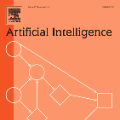As artificial intelligence (AI) systems are increasingly embedded in our lives, their presence leads to interactions that shape our behaviour, decision-making, and social interactions. Existing theoretical research has primarily focused on human-to-human interactions, overlooking the unique dynamics triggered by the presence of AI. In this paper, resorting to methods from evolutionary game theory, we study how different forms of AI influence the evolution of cooperation in a human population playing the one-shot Prisoner's Dilemma game in both well-mixed and structured populations. We found that Samaritan AI agents that help everyone unconditionally, including defectors, can promote higher levels of cooperation in humans than Discriminatory AI that only help those considered worthy/cooperative, especially in slow-moving societies where change is viewed with caution or resistance (small intensities of selection). Intuitively, in fast-moving societies (high intensities of selection), Discriminatory AIs promote higher levels of cooperation than Samaritan AIs.
翻译:暂无翻译



